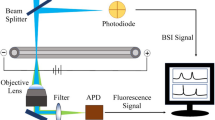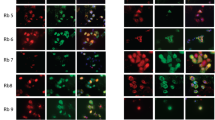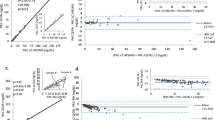Abstract
Young and George1 reported that the immunoassay of insulin, using an anion exchange resin method of separation2, was affected by human growth hormone (HGH). Addition of HGH caused a decrease in the proportion of insulin bound to antibody. When added to albumin, HGH had no such effect. From these results, they concluded that HGH increased the amount of free insulin in serum by displacing it from an insulin–basic protein complex. Wright, Welborn and Fraser3 were unable to duplicate these results using a double–antibody immunoassay system and suggested that the findings of Young and George were an artefact of their anion-exchange resin.
This is a preview of subscription content, access via your institution
Access options
Subscribe to this journal
Receive 51 print issues and online access
$199.00 per year
only $3.90 per issue
Buy this article
- Purchase on Springer Link
- Instant access to full article PDF
Prices may be subject to local taxes which are calculated during checkout
Similar content being viewed by others
References
Young, J. D., and George, E. P., Nature, 207, 1199 (1965).
Meade, R. C., and Klitgaard, H. M., J. Nuc. Med., 3, 407 (1962).
Wright, A. D., Welborn, T. A., and Fraser, T. R., Nature, 210, 418 (1966).
Author information
Authors and Affiliations
Rights and permissions
About this article
Cite this article
MEADE, R., KLEIST, T. Effect of Human Growth Hormone on Methods of Insulin Immunoassay. Nature 214, 195–196 (1967). https://doi.org/10.1038/214195a0
Issue Date:
DOI: https://doi.org/10.1038/214195a0
This article is cited by
-
Serum insulin in acromegaly
Diabetologia (1968)
Comments
By submitting a comment you agree to abide by our Terms and Community Guidelines. If you find something abusive or that does not comply with our terms or guidelines please flag it as inappropriate.



